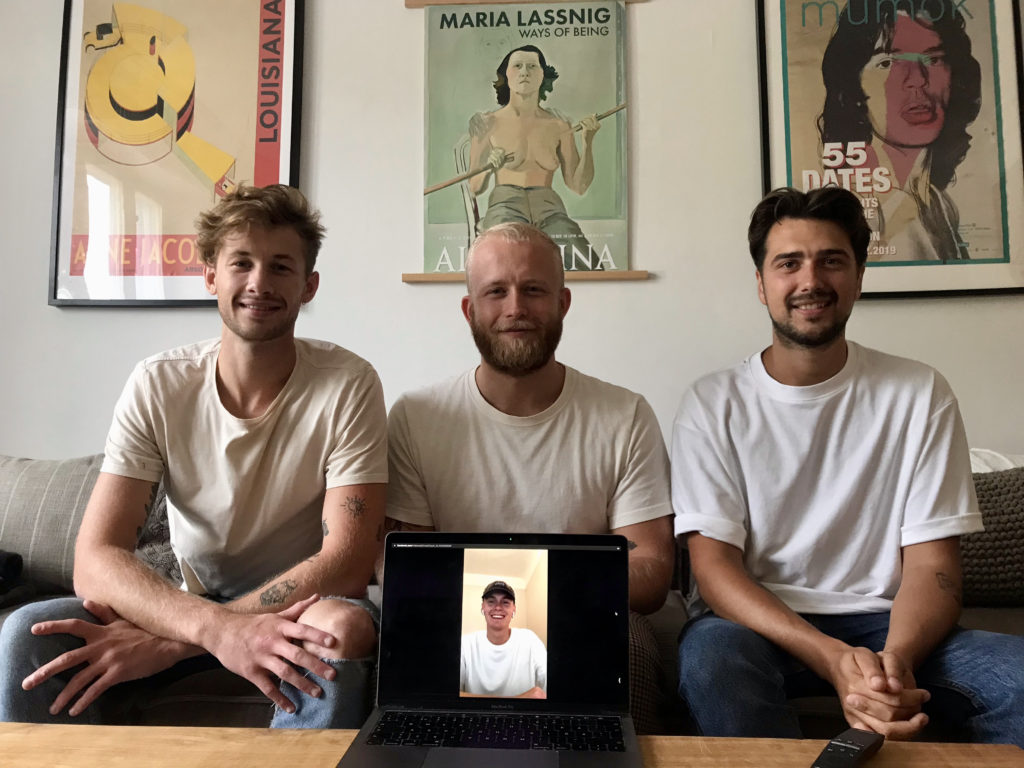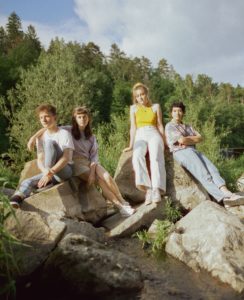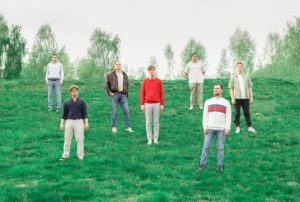Zum Abschluss unserer Interview-Reihe zu den Acoustics Concerts stelle ich euch die Band Maple & Rye vor. Maple & Rye – das sind Milton, Leo, Henrik und Gustav. Die vier Jungs kommen aus Göteborg, Schweden, und haben sich dort und in der Scandifolk-Szene bereits etabliert. Für die Acoustics Concerts am 06.09. in Berlin und am 08.09. in Hamburg packen die Schweden ihren Van voll Equipment und machen sich auf den Weg nach Deutschland. Ich habe Maple & Rye vorher bereits in Göteborg auf ein Interview getroffen. Ja, ihr lest richtig – so ganz in real life und vor Ort. Ihr könnt euch vorstellen, wie glücklich wir alle waren, nach über einem Jahr endlich mal wieder Interviews in Person führen zu können. Ich habe mit Milton, Leo, Henrik und Gustav über neue Musik und alte Songs gequatscht und nachgehakt, wie es ist eigentlich so ist in einer musikalischen Stadt wie Göteborg eine Band zu starten.
Maple & Rye im Interview
Anna: Hej guys, nice to meet you, hope you’re all good! To anyone who has not listened to your music before: Describe the sound of Maple & Rye in one sentence.
Milton: At least we get one sentence. Usually it’s like one word (laughing). There’s one description that we have previously used a little tag of folk inspired indie-pop. Yeah, I guess that’s still pretty true. We tried to combine all the genres we play into one phrase.
Anna: So, it’s been a little bit more than a year now since you released your first album. How do you feel about it now? If you would have done the same album again, would you have done something differently? Or still completely stand behind it as it is?
Leo: Great questions (starts thinking about it). I mean, we have better songs now.
Gustav: Exactly. Yeah, that’s where I always go in as well. We could like replace songs with those.
Milton: I agree, we do have some new songs that we’ve written since we recorded and released the album that we like even more, but at the same time, the package of that album makes a lot of sense. I think the songs, there’s a common theme in the entire album musically and somatically, production-wise, instrumentally. Yeah, I wouldn’t exchange any of the new ones for that album. But I’m very excited to release the new stuff. That’s gonna be a new package.
Henrik: Yeah, no if we did the same album at the same time, like one year ago again, not like now: Then I would probably have done the same.
Anna: It’s probably also like capturing that time, like how you felt about the music at that time.
Henrik: Yeah, exactly. And it’s hard, I mean: Would you would you have done anything differently? Maybe, but that’s what you felt like doing at that time. So why dwell on that really?
Milton: Any improvements we can apply to the next thing. We should write a song about that.
„We’ve reached a point where we have a certain sound“ – Is there gonna be change in the future?
Anna: So, when is the next album going to be released?

Henrik: It’s not on the horizon just yet. We have loads of material. But we haven’t started really recording and producing anything yet. But that’s next on the agenda.
Milton: Yeah. And then we’ll see, I guess, if it is a full album that we’ll do or if we’ll do an EP. I think we feel that we’ve reached a point to a little bit where we have a certain ‚Maple & Rye‘ sound. And there still is a clear kind of common theme towards where we’re developing into, but it’s a little bit of turning a page with what we’re doing next. And it might be that maybe an EP or a couple of singles to kind of introduce this maybe slight change of genre or tweak and what we’ve done before, might be a good little taster before going for the full album. We’ll see, we have a lot of strategy discussions to that.
Anna: At least you have a strategy!
Henrik: Yeah! And at least we have music. That’s the baseline, that we didn’t lose our inspiration on the way. I mean, that happens to a lot of artists.
So we’re really lucky that we’re still creating a lot.
Milton: Absolutely. I’m always excited to release the next thing. But it’s also slight curse, because it means that the second you release something you’re already over. You’re excited for the next idea.
Henrik: From what I’ve heard, that’s basically always true for musicians because it takes so long from the moment you write something to the moment you finish it, and then you record it, and then produce it and mix it. And then, like, you have a release date, but then it’s like, three months until we can actually release it. And then by that time, you heard the song like 200 times. And listened to every minimal detail. So yeah, I’ve heard a lot of people working in music saying that they hate every song they release, like they love it, when they start doing it. And they had to remember that they do actually have that feeling. But then when they release it, like, I don’t want to hear that song for a long time. But then they like remarried a song after a while, and they’ve gotten some distance to it. And like, okay, yes, that was actually a great song.
Milton: Because it kind of sucks because as soon as you release it, that’s when it’s life starts. Yeah, that’s when everyone else gets to hear it. We have to go promote it and go on tours. And that’s why it’s really important to write songs that you like playing live. Because that’s what you’re going to have to do, for the most part.
Love stories à la Maple & Rye about relationships and remarrying songs
Anna: Do you sometimes feel like that with songs, certain songs, that you can’t really play them anymore at concerts?
Milton: We’ve definitely had songs like that, where we’ve been like, okay, this song is now over and done. But then we’ve often remarried to where we’ve, with a little bit of space in between that song and the present. You’re able to look back at it and think that okay, well, this is a song that at least got this reception. Or you could think back to how you felt when you released it. And then it’s okay to start playing it again. Like we’ve had one or two songs like that, which we thought, okay, we’re never playing this again. And we did stop playing them for a long time. And now already in this summer, like last, for example, our first song that we ever recorded and released. There was a time where we didn’t play it at all for two years, maybe. And now we’ve played it a little bit as like, the third encore song when you have to chuck something else out in there. Yeah, that’s been fun.
Henrik: There’s always also, it’s been for us at least, when you go to play live, when you hear people say that they want you to play certain songs. And a lot of the time, there’s songs that we have, like not even thought about playing. Like ’no, doesn’t really fit the live set‘. But you know, people have relationships to all the songs on our album, even though we think that maybe that’s not like the most common song that people will like, there’s always some people who do like it and want to hear it live. So therefore, we kind of pick them up and need to be ready to play them anyway. And that also is a reason I think that some of them get like reintroduced to us as well. And like, okay, yeah, I actually do like the song more than I thought.
Playing songs live vs. recording an album: the differences
Anna: Do you have your favourites on the album? Like, very personal songs or so? That’s probably individual, I guess and differs for each one?

Henrik: Yeah, it does. I think we have some that are high, all of our individual lists, but they’re definitely individuals.
Milton: I think there’s definitely a common one that we each enjoy. I think all of us like to play that one live: ‚Con of the Century‘. Now speaking for everyone, but it looks like I’m getting some nods. It’s a song that we’ve played live since before we started the band almost. You know, it’s been with us since the very beginning. And we’ve been waiting to release it to try and find the right album and the context and producer and everything like that. And then we did release it on the album. And we continued to play it live and it’s one of the highlights.
Henrik: Yeah, it’s a very special very live song, a very good song to play live. It works well in that context. Although we have changed it quite a lot. We actually play it as it was originally played. That’s what we continue playing live, which differs from what we actually recorded, like instrumentally. It’s quite different. Both because we don’t really have brass instruments with us all the time when we go out on the road and stuff, because none of us play it. And it’s really expensive to hire musicians to go with you. We do like to have them with us when you’re playing bigger shows, because it really brings a lot of awesome stuff in a live set. But that’s one of the things that differs quite a lot. But then also when you play live, it’s more heavy drums, like more classic punk rock feel, sort of. But like the other recordings, like just a kick drum and some tambourine really is the rhythm section. And here is more like a full drum kit.
Gustav: And it’s a drum solo as well.
Henrik: And it’s really like a sing along song. Instead of, I don’t know if you know the song, but the hook that’s played by brass instruments on the recording, but that whole thing we just sing the melody.
„All four of us write music and we share experiences – there is always something to write about“
Anna: Sweet. So, this is more of like a typical question that you probably get a lot, but where do you draw inspiration for when you write songs?
Henrik: And you’re going to get the most boring answer that everyone says: Everywhere! Life! (laughing) But I don’t know. Like, that is true, it’s sort of everywhere. But I think we have some more common ones. Like stories from other people, books, movies, stuff like that. We have a couple of songs that are written very explicitly, like, sort of, not about a book but drawn straight from a book, like the inspiration for it. Yeah, stuff like that. We have a couple of those.
Gustav: And also emotions!
Milton: Yeah. Like, I think they’re, they’re a couple of things that we have recurring at least were one of them is definitely you know, books or movies and stuff like that, where it could either be about the book, or it is an adaptation of the book. So like the story told by the book, the character in the book or something like that, and we write a song about that person with that story. And like you said, emotions, there’s certain times that we’ve just heard a word about an emotion. For example, ‚Monterey‘, which is about, I can’t remember it’s got a really cool word, namely, this emotion. Anyways, it’s the emotion of not feeling good enough. And always feeling like you don’t live up to your own or other people’s expectations. It’s almost like a phobia. No, it is a phobia, an inadequacy. I think it’s really interesting, just emotions. Because it’s something that absolutely everyone feels, at some point to certain degrees. You know, like, if you’re in a relationship and you’re worried that that person is gonna leave you because you’re not good enough. You’re in a job and you’re scared of not doing well enough to get a promotion or to stay in your job. Or you’re playing in a football team, and you feel like you missed a pass and you made the team lose. There are so many examples in everyday life. And I think one good thing that we have, is that there’s four of us in the band. All four of us write music, and lyrics. So we can all pick different things from our own lives or experiences we share or discussions we’ve had and stuff like that. And since it’s four people, it means that the breadth of things, the stories we want to tell, is wider. And it also means that if one of us has no inspiration, there’s three other people to kind of pick up the slack.

Anna: Would you say that maybe living in Gothenburg influences you and your music? Because I feel like there’s always lots of music around. Different types of music and lots of live music. And in general, I feel like people here are very, creative and you’re not so judged in what you do. I hope that makes sense to you.
Milton: I think definitely, Gothenburg is a very open city where there’s people of all kinds and types and backgrounds and cultures doing different things and expressing themselves in different ways. And traditionally at least, Gothenburg has been a very open place for that. Which is I think one of the reasons which has created Gothenburg the music city or the art city. That is quite predominant, at least in Sweden. We always look at Germany and think: Hamburg and Berlin is the Mecca of creative things in Europe, you know? (grin on his face) But I think that has been very important for us. We’ve found each other here in Gothenburg. It made us Maple & Rye. It’s not like any of us really were deep in the culture scene in Gothenburg before we started playing music, but when we found each other and found this joint ambition, being in Gothenburg already opened up certain doors. In a way that there were people around us, there were music studios, we could go to. There were live music venues that we could play at. Everything from tiny little places where we had our first ever shows to the larger venues, where we’re now maybe playing and hopefully at some day, even larger arenas and stuff like that, which would be the dream.
„People in Gothenburg were always using music as a way to tell their stories“
Henrik: But I think in terms of getting inspiration from Gothenburg, I totally agree that it’s a very cultural city. I think it started long ago, like early 1900s. Maybe like the 20s, or something, I don’t even know. I think that sort of where Gothenburg’s music heritage started. And it’s just been present all the time. And I think that it gets out into everything around the city. And because of that, there’s so many people that really put their hearts and put a lot of effort into the music scene, to make it work, to make all these small places be able to run so that small bands and artists can get somewhere to play. That’s where they can find the crowd and then grow. So yeah, I think that really is quite inspiring, just to be in that sort of energy.
Milton: I think it’s also very tied to the kind of political and social economic history of Gothenburg in many ways because it’s always been this working class town with the big harbour, being like the big source of income. And historically, the music scene has been very tied to that as well with like, you know, the progressive rock. People were using music as a way to tell their stories.
„Playing live is addictive“
Anna: That’s a lovely view of the city, I can only agree. How important is it for you to be able to play live?
Gustav: Of course, it is a major part of playing music. And I think it’s also connected to, at least for me, motivation for writing music and everything that is connected to music – it’s playing for other people. So, yeah, it’s a major part.
Milton: Yeah, I think, it’s been tough the last year. I think, for everyone, just getting that motivation. A lot of people have been really innovative and found different ways of sharing their music through livestream things and, you know, getting inspiration in other ways and thinking outside the box. But overall, I think it’s been shit for everyone.
Gustav: And it’s also hard to find another place in your life where you get all these kind of emotions when you play and get that rush of adrenaline. And that’s there is a very rare thing in daily life.
Milton: Oh yeah, it’s addictive. You kind of like you go into some heroin withdrawal and then you get reminded again of how it feels.
Henrik: And I mean, we are a live band. We’ve always been a live band. We like to write our music so that we can play live. And therefore, the songs are organic, and are meant to be played live by us, you know. So, yeah, it’s a really big part of what we are as artists – of what Maple & Rye is.
Anna: What would you say was your best live experience so far? Was there one that really stood out?
Gustav: A lot of them. But I would say the show at Pustervik (concert venue in Gothenburg). When we released our EP and we didn’t realise that it was going to be sold out. That was just such an extreme experience.

Henrik: Yeah, definitely. That was just such a jump up from the venues we have played before. Everything was so much more professional. Everything around it, you know, all the arrangers and audio technicians and everything’s like a completely different level. So yeah, that was definitely a memory.
Milton: Standing backstage just before going on to stage, and we’re all just sitting there scared shitless but also, just the adrenaline pumping. The doors would open sometimes with people sorting things out, and you see the crowd. That was pretty unbeatable.
Henrik: Yeah, it was. But more of a recent one, I really remember is playing in Norway.
Anna: Oh, yeah, I saw a video of that concert. The scenery was just incredible!
Henrik: Yeah, when you’ve seen that footage … like, do I need to saw more? Yeah, that scenery, and just having a stage there. It’s just insane. So memorable in two completely different ways.
Milton: But there have been a couple of those where we were just in some incredible places. And then other ones where we’re just somehow ended up in some weird, incredible place, because we play music and we have to stop and be like ‚What is going on?‘ It’s been like Norway, where you’ve got this beautiful stage. And this beautiful scenery. Or when we went to California and played, there were pretty small gigs that we were playing. But we were also like, we’re on the other side of the planet. It’s 30 degrees warm, and we’re walking around Los Angeles, and we’re gonna play a pretty small gig. But we’re still playing in front of Americans all of a sudden, because we play music. Just small things like that, which are really special and memorable. In completely different ways.

Mit dem Laden des Videos akzeptieren Sie die Datenschutzerklärung von YouTube.
Mehr erfahren
Anna: I’m very curious right now because I always keep asking this questions to German bands aswell if they sing in English. Was it an active decision for you to sing in English? Because I think the Swedish indie scene is even more focused on performing in their mother tongue, aka Swedish. So I feel like that’s really big thing. Was that ever up for discussion?
Milton: I think we’ve all just naturally written in English.
Henrik: I don’t even remember it. We have definitely talked about it. Sort of in the bypass.
Milton: But there it’s been more: Should we write something in Swedish?
Henrik: Yeah, maybe to just try it out. That could be fun. But it’s not really been like ‚oh, we should switch to Swedish‘. I don’t think that’s on the agenda, not for now at least. But you never know.
Milton: I think it could be really fun to do something in Swedish. It would be a whole different process. My brain isn’t wired in that manner.
Henrik: Yeah. You know, like one of the biggest Swedish bands ever: Kent. They used to write in English at first and trying to go big outside of Sweden. And then they switched to Swedish and became the biggest Swedish band ever. So maybe that’s what we should do. We’ll see. (laughing)
Matching tattoos and the album cover
Anna: Haha, keep me updated! But to wrap it up: At the end of an interview, we always have a question that we kind of established to ask in every interview by now. You can take some time to think about it. Do you have an untold story of yours? It could be band related, so a special Maple & Rye story or something you want to say privately as a group of friends that you have never mentioned in any interview before. Kind of like a fun fact or so.
Milton: I’m always really bad at coming up with stuff like that. It’s just like my brain just freezes completely.

Henrik: Well, we do all have matching tattoos. That could be an interesting background story to tell. We got them before we made the album. Or kind of when we were in the decision of the cover for the album. Yeah, we were in the process of the album. And then we all got these tattoos at a festival where we played. And when we had decided … wait or was it after?
Leo: No, I think we just made that decision when we did it. We all got small record players tattooed. And then we looked at each other and we’re like, I guess we know what we’re putting on our album cover.
Henrik: And then we did this for the cover, but a lot more stuff. But yeah, that was like the basis on the album cover.
Anna: Okay, cool, that’s it for me then. Thanks a lot for the interview and I’m looking forward to the next opportunity to see a live performance of Maple & Rye!
Hier könnt ihr in das Album „For Everything“ von Maple & Rye reinhören!
Klicken Sie auf den unteren Button, um den Inhalt von Spotify zu laden.
Fotocredit: Emil Daniel (1,2 & 4), Anna Niere (3)







